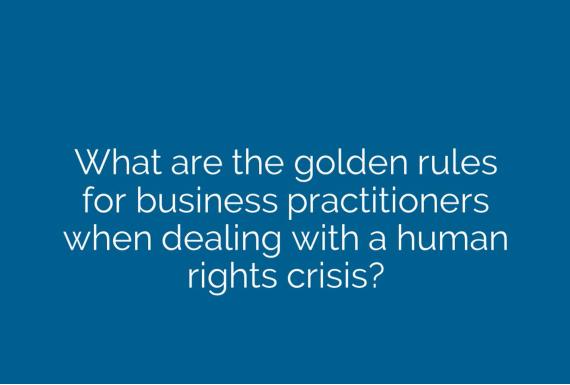Managing risks to people during a crisis
Crises happen.
Sometimes, they happen because a company has not managed a situation effectively or because small issues have escalated. Sometimes, they happen because of a natural disaster, in connection with conflict or political upheaval – or, as with COVID-19, a global pandemic.
Most of the time, a crisis will have implications for human rights – meaning the company should respond to the crisis in a rights-respecting way. This means understanding how the crisis situation – and the company’s response to it – could negatively impact people. And then taking effective steps to prevent, mitigate and remedy those impacts.
This can be hard. During a crisis, the situation can develop rapidly and there will be pressure to respond quickly, with little time for human rights due diligence or meaningful stakeholder engagement. Too often, a company’s crisis management team will not include a human rights specialist. However, when a company prioritises human rights, its response to the crisis can be far more effective – for affected people, the potential evolution of the crisis and the company's reputation, credibility and bottom line.
GBI BLOG: PANDEMIC SHOWS WHY HUMAN RIGHTS SPECIALISTS ARE NEEDED IN CRISIS MANAGEMENT TEAMS
What does rights-respecting crisis management look like in practice?
Ways to prepare for a rights-respecting crisis response:
- Build senior management's understanding of the value of managing human rights risks during a crisis – and their commitment to doing so.
- Strengthen the human rights know-how of individuals or functions likely to be involved in a crisis response.
- Plan for the unexpected and use simulations to pressure test the company’s preparedness.
Ways to respond to a crisis in a rights-respecting way:
- Ensure the crisis management team includes a human rights specialist or has enough human rights expertise to manage risks to people.
- Ensure any ongoing issue that negatively affects people is stopped and addressed as soon as possible.
- Prioritise meeting the immediate needs of affected people and groups – both within and outside the company.
- Communicate as openly as possible with relevant stakeholders.
What do the UN Guiding Principles say that helps crisis management?
The UN Guiding Principles on Business and Human Rights, or UNGPs, provide guidance relevant to managing human rights risks in all situations, including a crisis.
Key guidance includes:
- Processes to identify and assess human rights impacts should draw on internal and/or independent external human rights expertise – and involve meaningful consultation with affected groups and other relevant stakeholders.
- The case for drawing on independent expert advice is stronger where the situation and its implications for human rights are complex.
- Companies should communicate externally to account for how they address human rights impacts and report formally where human rights risks or impacts are severe.
- Companies should provide for or cooperate in the remediation of negative impacts that they have caused or contributed to.
See Guiding Principles 18, 19, 21 and 22 for more.
Insights from business practice
-
Be prepared and ensure your crisis response team has human rights expertise
Most large companies have defined crisis management teams at group and local/regional levels, which will convene once a crisis has been identified. It is important to identify yourself and the value of your human rights expertise to the heads of the crisis group well before a crisis occurs so that you may be called on, as appropriate, when a crisis breaks. If possible, establish yourself as an automatic member of the team.
As a practitioner, you need to explain clearly why you should be part of the team or available on call, depending on the nature of the crisis. Your added value can include the following:
- Human rights specialists can identify, at an early stage, individuals or stakeholder groups who may be particularly at risk - or may otherwise be overlooked.
- The specialist will also likely have on-the-ground experience of key issues, and understand their subtleties and historical background, as well as having useful contacts who can provide more information.
- Significantly, the specialist will bring a strong understanding of stakeholders' expectations regarding the company's performance, thereby enabling legal and reputational risks, as well as human rights risks, to be managed more effectively.
- The specialist also knows of national and international human rights standards and laws that may be relevant to the crisis, and ways to meet their requirements.
It is important that the value of bringing a human rights lens to the company's response is understood by those who lead the crisis response team in advance of the crisis. Once a crisis occurs, it will be much harder for human rights practitioners to be heard.
Depending on the nature of the crisis, the response team will include representatives from the business, security, communications, legal, human resources, investor relations and other relevant functions.
If the crisis response team opts not to have a human rights specialist on board, it needs to be trained on the human righst issues that can arise during a crisis and know about relevant international and national standards and laws. The crisis management team will also need to understand the ways the company may be involved in a human rights imapct through its response to a crisis, and have insight into the human factors that may determine an individual or group's background, response and/or behaviour.
Crisis simulation exercises can present a practical way to test the company's preparedness. Ensure the scenario incorporates human rights issues to enable the company to assess whether those involved in the crisis response have - or can access - the necessary human rights know-how.
For more, see: Pandemic shows need to integrate human rights specialists in crisis management teams
-
Communicate promptly and accurately
When a crisis breaks, it is critical that a company communicates – usually through its communications department or a senior executive – in a timely and accurate way. This isn’t just about managing the reputational risks – it’s also about respecting, and demonstrating respect for, human rights. Bringing a human rights lens to communication during a crisis can also enable the company to communicate more sensitively and effectively with relevant stakeholders. But bear in mind, there may be issues of sensitivity that should not be communciated. Be aware also that anything communicated internally or externally can spread beyond your intended target audience very quickly.
Depending on the nature of the crisis, seek to provide regular information, so stakeholders – including, in particular, those affected by the crisis as well as employees, the Board, lenders, home and host governments, etc. – understand that the organisation is engaged and working toward a solution. People want to hear directly from the company – don’t wait for the news to break elsewhere. Information can support affected people and groups, and help prevent or minimise any additional anxiety caused by uncertainty. It may also help to secure support from third parties when responding to ongoing issues.
Be consistent with your values and commitments. Ensure the company provides a response that reflects the integrity of the organisation from the beginning of the crisis until it has been resolved. If the company caused or contributed to the situation, consider carefully how to acknowledge this openly and, where appropriate, apologise.
-
Address and remediate the human rights risks and impacts
A company’s responsibility to respect human rights does not change when a crisis breaks. Companies should still take steps to understand, prevent, mitigate and – where appropriate – remedy the human rights risks and impacts they’re involved in. What is needed to meet this responsibility will vary with the nature of the crisis – and will likely evolve as the crisis unfolds.
When a crisis breaks, information is key. Getting people on the ground quickly to assess the situation is vital, although there will be certain types of crisis where a discrete approach is more appropriate. Initial responses may involve providing immediate assistance to affected people and communities, for example by ensuring access to medical and psychological support. In some situations, food, water, housing, fuel, cash and/or medicine may be needed. In others, working routines and conditions may need to be rapidly adapted, or security procedures initiated.
Always discuss the nature of your involvement with your crisis response team before taking action. Once you receive the go-ahead, use existing relationships with local experts, civil society organisations, public bodies, human rights defenders and others to get information quickly and feed it back to the crisis team to include in a rapid initial response.
As the situation unfolds, consider more deeply how people are or may be affected by the situation and engage with them on their needs. Go beyond the obvious – consider impacts on livelihoods, cultural practices, mental and physical health, education and so forth. Pay particular attention to individual groups that may be particularly at risk. Some crises can also interfere with the day-to-day management of the company’s human rights risks. For example, during a pandemic, it can be difficult to conduct human rights due diligence or audits if travel and movement is restricted. Think creatively about how best to maintain focus and momentum at such times – during the COVID-19 pandemic, virtual audits have helped companies maintain some visibility of human rights risks in their supply chains.
Where the company caused or contributed to the situation, it will be important to take steps to ensure the situation does not recur – and that the affected people have access to remedy for the harm(s) suffered.
For more, see: Commentary from GBI on key considerations when managing human rights risks during COVID-19
-
Don’t overlook the impact on employees and other internal stakeholders
In a crisis, the focus will often be on supporting affected people outside the company – and employees (particularly those involved in the crisis response) may set their own needs to one side in order to help others.
Consider the safety and wellbeing of those involved in the immediate response. Often during a crisis, responders will work long hours under stressful conditions. Companies need to be proactive to manage the risks that those involved in the crisis response will become exhausted, physically ill, injured, or suffer from anxiety, depression or other mental health issues. Ensure that appropriate support is available, and that people feel comfortable accessing it – and know how to do so.
Following a crisis, there is also a real risk that morale across the company will drop, and that the company may lose employees and struggle to recruit. Few people want to work for a company that doesn’t reflect their values. These risks can be managed, at least to some extent, with open and honest internal communication. Keep employees informed about the progress of the company’s response (including the results of any investigation) and demonstrate that management is taking responsibility for any problems and making tangible changes to address the issues.
-
Don’t waste a crisis
No one wants a crisis. But when one occurs, it can offer a powerful opportunity to engage senior leadership and others in the company on the importance of managing human rights risks effectively – and to increase focus and resourcing for this work.
Some practitioners have succeeded in leveraging a crisis to strengthen their influence and direct contact with senior management and even achieve a shift in the company’s strategy to better prioritise respect for human rights. Some companies have also made detailed, site-level human rights due diligence mandatory across their operations, introduced mandatory human rights training, and significantly increased the size of their human rights team.
Crises can also catalyse stronger commitment, coordination and action at an industry level, particularly where the situation places a spotlight on issues or challenges that are common across an industry or sector.
For companies that navigate multiple crises, lessons learned the first time can enable a more rights-respecting response to subsequent situations – improving the support provided to affected people and enabling a more rapid and effective response.
Looking forward: Prioritising human rights during a crisis
We see a number of opportunities to more fully embed respect for human rights more fully in crisis management. These include:
Mainstreaming human rights in business: A key challenge for human rights specialists is building the crisis management team's familiarity with the company’s human rights risks and responsibilities. And their understanding that human rights are not just a 'nice to have' during a crisis. The COVID-19 pandemic has done a lot to raise the visibility of human rights issues in crisis situations. We need to build on this progress to strengthen understanding within companies of the importance of human rights risk management when responding to a crisis.
Enabling companies to share practices, insights and lessons learned: Real preparedness for a crisis comes from being able to foresee and plan for different scenarios, and learn from mistakes – both the company's own, and those of others. However, when it comes to crisis situations generally – and the human rights dimensions of these in particular – it can be difficult for companies to share openly their practices, insights and lessons learned with others. Many sensitivities and legal risks need to be navigated and can reduce the level of sharing. We need to find better ways to support companies to do this, even when it is difficult, to minimise the human rights harms of future crises and improve companies' responses to them.




 Download, PDF
Download, PDF

